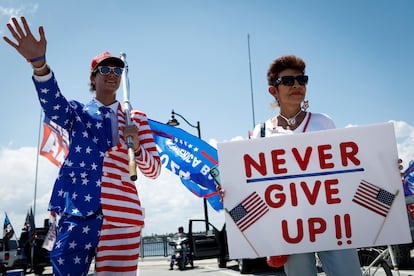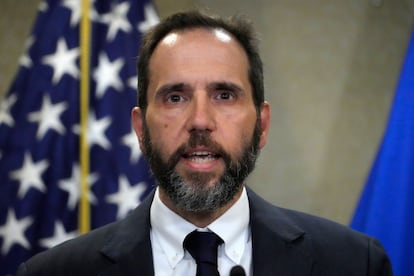Trump’s indictment over Mar-a-Lago papers puts US democracy to the test
The case against the former president for seven federal crimes has heightened tensions in the country, which is divided between those who think it is a ‘witch hunt’ to prevent him from running again and those who hope it will show that no one is above the law

Donald Trump — an infallible factory of slogans — showcased a particularly successful one during the Conservative Political Action Conference in March: “I am your justice. I am your retribution.” The rhetoric of a man who alone carries the resentment and martyrdom of his voters was later developed with another: “They’re not coming after me, they’re coming after you; I’m just standing in their way.”
At the state conference of the Republican Party in Columbus, Georgia on Saturday, Trump used this last phrase again to warn about the shadowy “they” — a collective figure that includes President Joe Biden, the FBI and the Department of Justice, among others. It was his first speech after his indictment for his handling of the Mar-a-Lago papers was announced. The case involves a hundred boxes, containing some 13,000 documents, around 300 of them classified, which Trump took without permission from the White House in January 2021, when he ceased to be U.S. president. The case promises to test the U.S. judicial system and the country’s very democracy.
Trump has been summoned to appear in a federal court in Miami on Tuesday, where he will hear the charges against him. The former U.S. president is charged with 37 felony counts, 31 relating to the willful retention of national defense information; three for withholding and concealing documents from a federal investigation; two for making false statements, and one for conspiracy to obstruct justice — a charge that has also been levied against his personal aide, Walt Nauta. It is the first time in history that a former president has faced federal crimes — seven, to be exact.
Trump, who has confirmed that the charges will not deter him from running for president, reacted to his second indictment in typical fashion (his first indictment took place in New York in April and concerned his role in hush money paid to porn star Stormy Daniels to cover up an alleged extramarital affair). Last weekend, Trump called the charges a “joke,” a “travesty of justice” and “election interference,” even though under U.S. law, he could run for office from behind bars.

Trump’s rhetoric, loaded with misinformation and half-truths, has riled up his followers, who have promised revenge. Republican Congressman Andy Biggs tweeted on Friday: “We have now reached a war phase. Eye for an eye.” Former TV host Kari Lake, who refuses to admit that she lost the Arizona gubernatorial election last November, also threatened retribution. “If you want to get to President Trump, you’re going to have to go through me, and you’re going to have to go through 75 million Americans just like me,” she told a convention of Georgia Republicans on Friday. “And most of us are card-carrying members of the NRA [National Rifle Association]. That’s not a threat, that’s a public service announcement.”
These comments are at the extreme end of the side of the country that believes Trump’s indictment is proof that his enemies are using the judicial system to hamper his chances of winning the 2024 election. Meanwhile, Trump’s lead in the Republican presidential primaries is widening with every new legal trouble he comes up against. The Stormy Daniels case marked a dramatic shift in his chances of winning the Republican primary, giving Trump a double-digit lead in the polls over his main rival, Florida Governor Ron DeSantis. The latest poll, conducted by CBS News and YouGov last weekend, shows 61% of Republican voters would back Trump, compared to 23% for DeSantis.
The other side of the ideological spectrum holds a very different view of the indictment. They agree with Trump supporters that democracy is in danger, but not for the same reasons. This side believes the case against Trump is a test of U.S. democracy that the country must not fail; it must prove that no one is above the law, not even a former president.
For this side, the 49-page indictment is resounding proof of Trump’s guilt. Written with great care by special counsel Jack Smith — an independent lawyer who has become the latest target of Trump supporters — the document provides evidence of how classified documents were moved from place to place inside Trump’s Mar-a-Lago mansion in Palm Beach, Florida. This information was obtained from security cameras, photographs which show the boxes of classified documents in spots such as a bathroom and a ballroom stage, as well as conversations between Trump and his staffers with people who were shown the top secret reports despite lacking authorization.
This attitude and the way employees described Trump’s relationship with the Mar-a-Lago papers (“Potus specifically asked Walt for those boxes to be in the business center because they are his ‘papers,’” reads one conversation included in the indictment) are the only clues to what is the biggest question in the case: why did Trump take the papers to his Florida home when they belonged to the National Archives?
Republican presidential candidate Chris Christie, who was Trump’s friend until he became one of his biggest enemies, offered his own theory. “Look, none of us, I think, who know him are surprised. He wanted to keep these documents as a trophy,” he told the ABC TV network on Sunday. “He can’t believe he’s not president. He can’t believe he still doesn’t get these documents. And he needs to display to everybody down at Mar-a-Lago, or up in Bedminster [Trump’s home in New Jersey] during the summer, that he still has some of those trappings.”
While the country holds its breath ahead of Trump’s “historic” court appearance on Tuesday, Biden has continued to maintain a tactical silence. After all, he is also under investigation over his handling of documents from his time as vice president, which were found years later in his private office and at his Delaware home. While in Biden’s case the number of documents and their contents were not as sensitive, the president is trying to maintain distance to prevent accusations of political interference. On Friday, he said he had learned of the indictment from the press.
It’s the “right move,” according to Georgetown University historian Michael Kazin, author of What It Took to Win, a biography of two centuries of the Democratic Party. “Biden’s critics would use anything he said against him,” he said in an email. “His best strategy, at least for now, is to let the case run its course through the courts. Of course, if he ends up running against Trump on the campaign trail, he’s going to have to address it. But that won’t start until next summer.”
Kazin points out that Attorney General Merrick Garland decided to entrust the Mar-a-Lago investigation to Smith to ensure that no member of Biden’s cabinet was involved. “Doing otherwise could be construed as a conflict of interest,” he explained, “although Trump is being prosecuted for federal crimes, so there is no way to avoid federal charges from being involved.”
Smith has promised a “speedy trial,” but others believe the process may drag on. Last weekend, Paul Rosenzweig wrote in The Atlantic that the case may not go to trial for a year, which would coincide with the presidential campaign. Using a basketball simile, Rosenzweig concluded: “In any other circumstances, given the weight of this evidence, the case would be a slam dunk. But in the current state of affairs, the case is more aptly characterized as a difficult contested shot from beyond the three-point arc.”
In the indictment, Smith has tried to cover all bases to ensure that the case is, in fact, a slam dunk. The document even includes statements made by Trump during the 2016 campaign, such as: “In my administration, I’m going to enforce all laws concerning the protection of classified information. No one will be above the law” and “We can’t have someone in the Oval Office who doesn’t understand the meaning of the word confidential or classified.”

The indictment does not mention that these public statements were made in reference to Hillary Clinton and the investigation into how she used her private email to discuss classified material when she was secretary of state. Republicans have been quick to point out the similarities between the cases, highlighting that the Department of Justice decided not to file charges against Clinton. “Is there a different standard for a Democrat secretary of state versus a former Republican president?” DeSantis asked Friday night at a party convention in Greensboro, North Carolina.
The scandal over Clinton’s emails was one of Trump’s best weapons in 2016, and led to another of his effective slogans: “Lock her up!” Back then, the slogan worked. Clinton may not have ended up in jail, but Trump did end up in the White House.
Sign up for our weekly newsletter to get more English-language news coverage from EL PAÍS USA Edition
Tu suscripción se está usando en otro dispositivo
¿Quieres añadir otro usuario a tu suscripción?
Si continúas leyendo en este dispositivo, no se podrá leer en el otro.
FlechaTu suscripción se está usando en otro dispositivo y solo puedes acceder a EL PAÍS desde un dispositivo a la vez.
Si quieres compartir tu cuenta, cambia tu suscripción a la modalidad Premium, así podrás añadir otro usuario. Cada uno accederá con su propia cuenta de email, lo que os permitirá personalizar vuestra experiencia en EL PAÍS.
¿Tienes una suscripción de empresa? Accede aquí para contratar más cuentas.
En el caso de no saber quién está usando tu cuenta, te recomendamos cambiar tu contraseña aquí.
Si decides continuar compartiendo tu cuenta, este mensaje se mostrará en tu dispositivo y en el de la otra persona que está usando tu cuenta de forma indefinida, afectando a tu experiencia de lectura. Puedes consultar aquí los términos y condiciones de la suscripción digital.









































